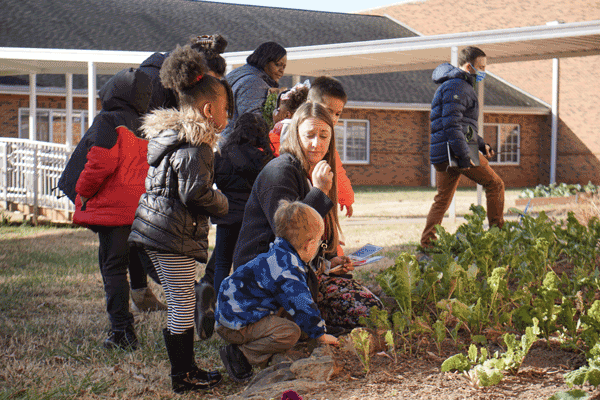Overview
Farm to Early Care and Education (Farm to ECE) enhances the health and education of young children through experiential learning that connects children and their families with local food and farms. Farm to ECE includes activities in ECE environments that incorporate local foods through meals and snacks, taste tests, lessons, farmer visits, cooking, and growing food with community and parent involvement.
Why is Farm to ECE important?
Farm to ECE has the potential to deliver a triple bottom line—children, farmers, and communities can benefit from high-quality Farm-to-ECE models. Children who have increased access to nutritious local food will be more likely to enter school ready to learn and grow. This will lead to better educational and health outcomes for North Carolina’s youngest residents. Farm to ECE activities also improve the quality of ECE providers by incorporating hands-on, experiential learning related to food, health, agriculture, and nutrition into the ECE setting.
Farmers, food processors, food hubs, and food manufacturers can take advantage of a previously untapped financial opportunity by engaging with ECE providers. Farm to ECE also benefits the larger community by offering opportunities for strengthening family and community engagement by increasing access to healthy, fresh local foods.
How Can Farm to ECE promote racial equity in our communities?
Farm to ECE enhances the health and well-being of all children and their families and supports the development of community food systems. Children of color are disproportionately affected by food and nutrition insecurity. Farm to ECE has the potential to increase access to healthy food in all communities, and to promote family and community engagement in ECE programs.
Examples of racial equity in Farm to ECE activities include reaching out to parents about what they would like to grow in the school garden, inviting them to prepare a special meal or snack in class, and sharing their home culture with all the students and families. Educational materials and books that show children and diverse cultures can help to share more racially and ethnically inclusive stories about the culture of food and farming. There may also be neighboring agencies or communities that wish to support the garden financially or with technical expertise. Celebrating the assets of the ECE community is an important piece of Farm to ECE that can provide rich learning opportunities for students. A full list of inclusive family engagement activities can be found at the end of this guide.
Publication date: Jan. 19, 2023
LF-20
Other Publications in Farm to Early Care and Education Resource Guide for North Carolina Extension Agents
N.C. Cooperative Extension prohibits discrimination and harassment regardless of age, color, disability, family and marital status, gender identity, national origin, political beliefs, race, religion, sex (including pregnancy), sexual orientation and veteran status.


